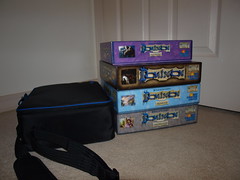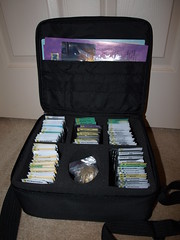Most of my blog readers are people who aren't in my regular gaming group now, so I thought it might be interesting to go through the board and miniatures games I played this year with a brief summary of my impressions of each. The order is chronological from the first play in 2009.
Battlestar Galactica: This is a fun game, although after three plays, and comments from those who have played more, it seems like the Cylons have an advantage. Combined with the fact that in the base game there's no way to decide ahead of time who is going to play the Cylons, this game slides a bit on my personal scale of desirability, although I'm still more than willing to play it if someone else wants to.
Lord of the Rings Strategy Battle Game: This is an interesting tactical miniatures game from GW. I played it a couple of times earlier in the year, but it's been gathering dust since then. The main draw of this game is the relatively low monetary investment involved compared to other GW games. If there was a community already playing it then I'd join in, but I'm not interested enough to build that community on my own.
Pandemic: Great cooperative game. Took a while to figure out how to win, and even then it still has great replayability with plenty of options to ratchet up the difficulty, especially with the expansion. This one is one of the few games to get on my BGG "fives and dimes" list with seven plays this year.
Small World: Another one of my few "fives and dimes" this one has become something of a staple with our group. The reasons for this are simple game play that's easy to teach, a relatively short play time, and lots of variation in the way that race/ability combinations turn up. It doesn't hurt that there's also a copy in the FLGS game library, which means I don't have to lug it along with me.
Warhammer 40K: I was big into this in the middle of the year, to the point where it's my most played game this year, but I burned out after a few months. Lots of reasons for this that I won't go into for now. I still think it's a good game, but I think there are games out there that are just as good, or better, that require a much smaller investment in both time and money.
Race for the Galaxy: My second most played game this year behind 40K, and one of two games to be added to my all time favorites list this year. This game has a great combination of theme and gameplay. The nature of the way the game plays results in little downtime, and it scales well as more players are added. We play this game now with the cards from both expansions, but have yet to use the new rules introduced in those expansions, mainly because there's almost always someone playing the game for the first time when we play.
Puerto Rico: My personal pick for the most overrated game prior to 2009. Not that I think it's a bad game, I just don't feel it deserved to hold the #1 spot on BGG for as long as it did. I've played about a dozen of the remaining top 20 games, and I'd rank all but a couple of them over Puerto Rico. I did get talked into playing a game earlier in the year and enjoyed it, but it's still not one that I'll suggest myself.
Dominion: Seems like a good game, but I haven't had the chance to play it much. I could see this becoming one of my all time favorites, but can't tell for sure yet. Hopefully I'll get a chance to play it more in 2010.
Space Hulk: I'd like to get to play something other than the 1st mission of this. A fun game, but I just don't get that many chances to play two player games anymore, and there are several on my list above this one.
Age of Conan: The Strategy Board Game: A decent game, but one that just never clicked with me. For some reason it seems to take as long to teach as it does to play, and it's not that short a game. That alone has kept it from getting replayed in an environment where there's almost always at least one player who hasn't played before. Still, it's something I'd recommend to anyone who enjoys good old Axis & Allies style conquest games. It's not really made in that mold, but it has elements from that genre combined with a shorter play time. Especially if you have a fixed group of gamers that only has to learn the rules once.
Agricola: The game that unseated Puerto Rico from the top spot on BGG, and deservedly so. The more I play this game the more I like it. The way the cards work make every game different. This is the second game on this list to make its way onto my all time favorites list this year.
Ad Astra: This game is a little too light for my tastes, but has been popular with others in the local gaming group. It does make for a nice space exploration/development game that's competitive without being cutthroat.
Marvel Heroes: This game has a great combination of theme matched to mechanics. It's a shame that the developers no longer hold the license, as it could have supported expansions. Instead, it's out of print. If it wasn't, our one play through probably would have sold a couple of copies.
Chaos In The Old World: This is another game, like Conan, that I can appreciate, but that just doesn't click with me. Nice mechanics, but I'm still having trouble developing competitive strategies in the game. I'll play it again, but probably won't suggest it.
Flames of War: My only play of this in 2009 was a demo game. I still love it. There's a good chance I'll be able to get back into this next year as it looks like there's a couple of locals that are finishing up their armies.
Memoir '44: Got a couple of plays of this using scenarios from the relatively new Mediterranean expansion. I still love the Commands & Colors series of games, but as I mentioned before, it's difficult to find opportunities to play two player games.
Bang!: Broke this one out one night when we had one of our larger groups and it was a big hit. A great filler game for larger groups.
Shogun: Finally got this one back on the table. I still really like this game, both the theme and the mechanics.
Wasabi!: Nice game, but makes me hungry. I've gotten it out of my system for now, but am pretty sure it will eventually make its way back on to my "want to play" list.
The Princes of Florence: One of only two games I played this year that I don't own. It's an interesting game. Reminds me a bit of Puerto Rico and other games in that genre. There's an auction mechanic and you build stuff. I'd play it again, but it's not on my wishlist.
Warhammer: Invasion: The only other game I played this year that I don't own. A surprisingly good card game from Fantasy Flight. Just playing with the cards out of the starter box has been quite fun. I don't know how well it will hold up in an environment where people construct their own decks. It suffers from being a two player game, although it looks like they intend to expand it out to more players at some point. The main reason I haven't bought this yet is that it's in the FLGS's library, and I never play it anywhere other than there. Also, the copy the FLGS has for sale is in a slightly damaged box, and the owner hasn't yet learned to send damaged merchandise back to the distributor.
Steam: I need to play this one at least one more time before making a final decision on it. It feels a little too cutthroat to me after the one play I had, but I'm definitely willing to give it another try.
Felix: The Cat In The Sack: Finally got a chance to play this one. Don't really care for it. Successful play seems to rely on card counting, which is something that is not fun for me.
Arcane Legions: The last game on this list. It's too early to tell if it will stand up over time, but I've enjoyed it so far. This despite my skepticism going into it. Expensive for a board game, but dirt cheap for a miniatures game. I still feel that the marketing is a bit off. I don't intend to treat this as a miniatures game, in that I do not plan on ever painting a miniature, but I will play it. How much I end up investing in it will be largely up to the others playing it. I don't plan on taking the lead with this one, but will try to stay competitive.
So that's it for 2009. With luck, my 2010 list will be longer.

















I disagree. It's certainly a better game without the house rules, but it still sucks.
It goes on forever even with property auctions and no free parking money, and once one player gets ahead the outcome is nearly always inevitable. The worst part is that one player often takes the lead as early as the halfway point, or even sooner! That's a lot of time wasted finalizing a result that has already been determined.
There are worse games out there, but none with the immense visibility of Monopoly. It's often described as the 'best selling' or 'most popular' game, which makes people think that it must be the pinnacle of board game design, and as a result they don't even try other games.
This is only now starting to change, a decade after eurogames started to penetrate the US market, and even now it's only changing in small ways. Pretty much every article in the mainstream press about board games starts with some variation of "there's more to board games than just Monopoly!" The fact that is still necessary speaks volumes about how the damn game holds back the entire genre.
Not that I have strong feelings about it or anything...